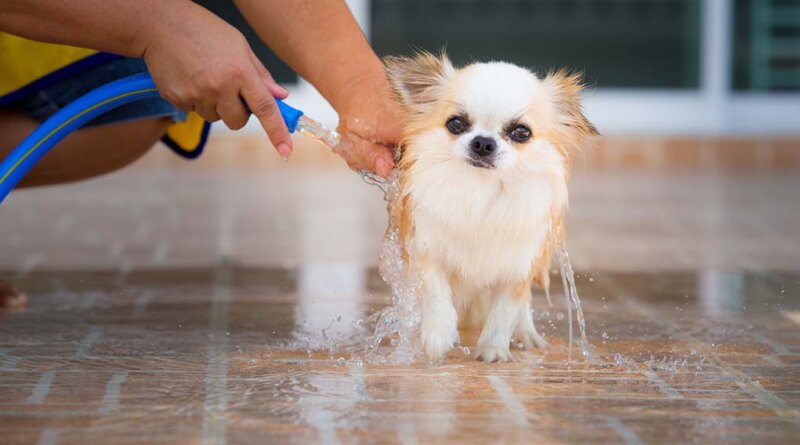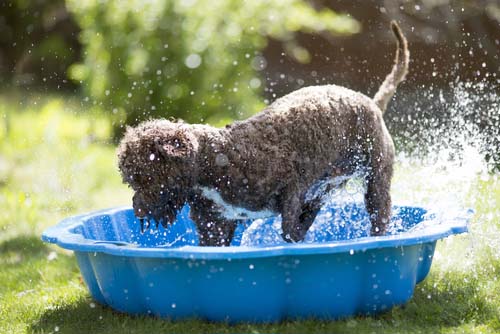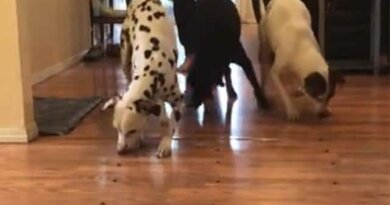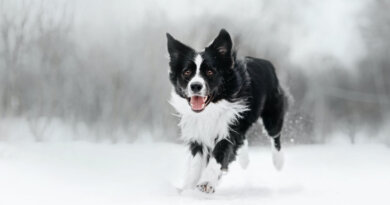10 Tips on How to Keep Dogs Cool Outside in the City This Summer
Summer means continuously rising temperatures. While dogs love the great outdoors and crave exercise no matter the temperature, you must know how to keep dogs cool outside to avoid problems like heat exhaustion or heatstroke, and there are a few methods (and reasons) to do it.
Every year vets warn owners about the hazards of hot weather. To understand the signs of heat related health problems in dogs, you must first know how a dog manages to beat the heat on a hot day naturally.
How Dogs Regulate Body Temperature
We regulate our temperature by sweating because wee have sweat glands, but for dogs these are only located on their paws and in their ears, and even still the number when compared to ours is small (which is why dogs resort to panting).
If you’ve ever noticed how your pet shies or pulls away from you when you touch or hold their paws, it’s because they feel vulnerable. It’s also because that is where they regulate their body temperature. The feel of a warm human hand gripping their paw can feel stifling.
The dog’s wet and shiny nose serves an important purpose, too. When they’re hot and panting excessively, the wetness of their nose acts as a cooling mechanism. The canine body is able to turn the moisture from the nose into cool air while also expelling excess heat through the open mouth.
This cooling cycle is efficient but cannot withstand long duration of heat and humidity without placing the dog in danger of stroke, which is why all pet owners must know how to keep dogs cool outside in summer.
How to Keep Dogs Cool Outside This Summer
1. Know the Signs of Overheating or Stroke
Knowing the signs of heat exhaustion in dogs is the most crucial aspect and the best way to ensure how to keep dogs cool outside. Watch out for these symptoms:
- Excessive panting
- Not wanting to move (followed by or following collapse)
- Anxiousness (pacing, whining, ears pulled back)
- Fever (Anything over 99.5 – 102.5 could be worrisome, especially when paired with other symptoms on this list)
- Dehydration (can be paired with vomiting and/or diarrhea)
Use extra caution if you own a short-snouted canine. Brachycephalic breeds such as Bulldogs, Boxers, French Bulldogs, and even the mighty Cane Corso are more likely to experience heat exhaustion or heatstroke than others.
2. Seek Out a Cool and Comfortable Spots
When camping or hiking with your dog, take breaks often. If you can handle, it doesn’t mean the dog can. Let your pooch sit in the car with you while you have cold AC air blasting until the dog stops panting.
If at home, routinely go back indoors and relax before taking up play time again. Additionally, if you can find a nice shady spot at the dog park, call your pup over and have them rest in the shade (for hyperactive breeds or puppies, you may even need to force this behavior because they’re likely to refuse).
3. Transform Your Backyard into a Doggie Oasis
The best tip on how to keep dogs cool outside is to use water and shade. If you have a backyard, invest in a dog pool or a kiddie pool (if you don’t have a proper pool there). You can fill up the pool the night before, so the water is nice and cool the next morning. The cold water will feel wonderful on your dog’s paws but will also offer them hours of entertainment. You can even put on your swimsuit and join them.
If your yard is lacking natural shady trees, then you can make artificial shade by putting up some outdoor umbrellas or even taking the opportunity to practice some curb-appeal and install an awning, or build a pavilion. If you’re into DIY stuff, then not only will you enjoy it, but your dog will certainly appreciate it.
By the same token in terms of how to keep dogs cool outside, you can invest in other supplies like a misting system or a cheaper paddling pool instead of doggy one, or a pet cooling mat. And, of course, make sure your pup’s water bowl is full at all times and not hot in temperature. If you own more than one pet, you may want to use multiple bowls as some food-aggressive dogs can be reluctant about sharing a watering bowl.
4. Pay Attention to Your Dog’s Paws
Cooling off your dog’s paws help to cool the dog’s body as a whole. So when going out for a long hike or a weekend trip to the lake is the most important time to think about how to keep dogs cool outside.
Pack a cooler! This will provide you with ice cold water but also ice cubes which can be smoothed over your pup’s paws which will help them cool down. It’s likely they won’t welcome this tactic unless they’re extremely hot so watch for signs of overheating and be gentle when applying.
5. Change Up the Routine
Dogs thrive on a routine and changing it up can actually lead to doggie depression, but only in extreme circumstances. If you don’t already do this, reroute your pet’s walking or playtime routine to mornings and evenings when it isn’t as hot.
Avoid walking at the hottest part of the day, usually around 2 or 3 p.m. as this can pose serious heat exhaustion issues. This is the easiest of tips on how to keep dogs cool outside since it requires the least effort. If you have to walk them or let them out at a peak hour, make it a short bathroom walk and certainly don’t jog or instigate running.
6. Be Aware of Paw Blisters
While your pup’s paw pads are like durable built-in shoes, they are still vulnerable to heat. If you’ve ever painfully hopped across white, hot sand on the beach, then you can probably envision what hot surfaces may feel like for your canine companion.
In extreme circumstances, the tough skin of their paws can even blister, tearing open. Dog paw care is essential but often forgotten. Healing open wounds on paws is a difficult process – imagine walking around on bandaged, burnt feet.
Avoiding hot surface is one of the ways of how to keep dogs cool outside. You can test if your pet could endure trotting along a hot asphalt or cement by placing your hand – either the back of it or your palm – on a sidewalk.
If you can comfortably keep your hand on the surface for 5 seconds or more without it feeling scalding, then your pet is okay to walk on the concrete or pavement. However, if you can’t endure the 5 seconds without cringing or gasping, then you should wait to walk your dog later in the day.
Alternatively, you can walk on the grass instead of hot pavement or concrete and this will help keep them nice and cool, too. Using dog shoes can also help.
7. Bring ‘Outside Dogs’ Inside
It goes without saying that no dog should be kept outside 24/7. But if you happen to own a dog that you and your family affectionately call an “outside dog”, meaning they typically hang out in your yard by choice, you should consider bringing them indoors during warm months. While your pet may typically prefer being outside, it’s unlikely they enjoy enduring extreme heat (and don’t even know it).
When it comes to keeping dogs cool outside, its crucial to understand what the dog needs even if he doesn’t show any signs of overheating. And if you’re waiting for the day that your dog turns to you and says, “Please don’t leave me outside today. It’s so hot,” that day may or may not come.
Instead, try paying attention to your pet’s non-verbal cues:
- panting
- over-excitement to come indoors
- lack of excitement or reluctance to go outside
- a licked-clean water bowl
- when in the yard, staying sprawled out in a shady spot
If you or a household member are anxious about leaving the dog unattended in the home, introduce a crate to your lifestyle. These items give Fido a safe space to relax while also keeping them out of anything you probably don’t want them to get into (like the garbage, for instance).
Put their favorite blanket or bed in the dog crate as well as a chew toy or two, and add a dog crate cooling fan for summer months. Alternatively, some owners may choose to keep them in a bathroom or utility room (with open door), which isn’t a terrible option especially since both usually have nice, cool tile for them to sprawl out on.
8. Brush Them More Often
Canines will naturally shed their undercoats, which is one of their own answers to how to keep dogs cool during warmer seasons. However, you can help them out with this by brushing your Fido regularly. Washing your dog can help rid of extra hair that needs to be shed but be sure to not bathe them too often as this strips them of natural oils which keep their coat and skin healthy.
If your pet doesn’t have a double coat, take them to the local pet groomer for a cut. However, you should know that no matter the length or thickness of a canine coat, this hair helps them stay both warmer in cold weather as well as cooler in hot weather. You could inadvertently hinder them from staying cool without asking a dog groomer or veterinarian you trust their opinion when it comes to a haircut.
Don’t shave double coats. Breeds known for their double coats are Huskies, Chow Chows, Bearded Collies, Shiba Inus, among others. In fact, even terriers can have double coats which aren’t always long or fluffy like a Malamutes’. If you’re unsure of your mutt’s breed, consult your veterinarian or a dog groomer to find out if they have a double coat or not.
9. Avoid Strenuous Workouts
For many pet owners, the best part about having an animal companion is that they have someone to enjoy exercise with (or someone who motivates them to exercise at all). While most dogs are likely to inherit or adjust to their owner’s lifestyle – a couch potato owner equates to a couch potato pooch – these companion animals still need routine exercise and socialization with other dogs in order to lead a completely happy life.
You know your pet best. An energetic Terrier puppy may need twice – or thrice! – as much energy-exertion when compared to a laid-back 5-year-old Yellow Lab, but there’s a right way to do it and a wrong way.
Knowing your pup and what they need to stay in shape mentally and physically doesn’t mean you need to sacrifice playtime when it’s hot, but rather accommodate the warmer weather and know how to keep dogs cool outside in summer when exercise is needed.
This may mean going for your daily jog earlier in the morning or later in the evening instead of in the middle of the day. It could also take the form of cutting off a game of fetch earlier than usual when you notice them panting excessively. As mentioned before, most dogs won’t say no to a good game or frolic in the park so it’s up to you to look out for what’s best and safest for them.
10. Ask Your Vet About Sunburn
The last tip on how to keep dogs cool outside this summer is to consult with a professional. If you have a fair-haired dog or a dog with a thinning coat, it’s possible for them to get sunburn just like us.
To keep your pup safe from sunburn, reduce their exposure to direct sunlight. You can also put a dog shirt or better yet a dog cooling vest on them if this helps cover any vulnerable spots. You should also consider making an appointment to talk to your veterinarian about animal-safe sunscreen and any additional tips on how to keep dogs cool outside in summer specifically for your pets.
READ NEXT: Top 5 Best Dog Cooling Fans for Home











write my essay for me top essay writing websites writing an essay help
blackweb dark web link
how big is the darknet market how to buy from the darknet markets lsd [url=https://world-onion-market.com/ ]darkfox market link [/url]
best dark web counterfeit money top darknet markets
how to install deep web back market trustworthy
Experience the leading-edge [url=https://xtrime.site/]xtrime[/url] nicotine pouches online store with an unparalleled assortment of pouch flavors!
dark web link blackweb official website
how much is tizanidine 4mg
darkmarkets dark web search engines how to get on dark web
darknet markets [url=https://darknet-marketspro.com/ ]darknet sites [/url] how to get on dark web
generic celebrex cost